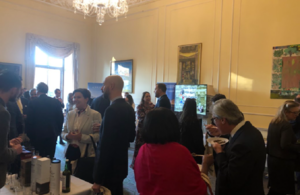Good morning everyone,
I’m really pleased to be here in person to open this event and to see so many familiar faces once again.
I want to start with a big thank you to Times Higher Education for inviting me to speak today, and to John Gill for such a warm introduction.
You won’t be surprised to hear that recovery has been a word used in the title of a lot of events and meetings I have attended or spoken at over the last year, so I am sure that I am not alone in feeling incredibly excited that we are finally at an event aimed at exploring how we as a sector are moving beyond recovery.
The fact that we are here in person today and have the luxury of being able to plan for a future where COVID no longer causes mass disruption to learning is testament to the incredible work of our frontline staff – including thousands across higher education.
As we speak, there are university campuses up and down the country filled with students enjoying their university experience, businesses of all kinds are welcoming trainees and apprentices back to the hands-on learning that they value so highly, college classrooms are bustling with aspiring young people eager to build their skills and lay the foundations for their future.
In many ways, we are getting back to what we know as normal.
And although ‘normal’ has been the goal for all of us in the last two years, today I am going to throw a bit of a spanner in the works, as I am going to talk a bit about how we as a government are not content to return to what we know as normal when it comes to further and higher education.
In fact, the normal, status quo, comfort zone approach to education is in my view something that COVID has helped to break us out of, and as a result, we now have a once-in-a-generation opportunity to enact historic reforms that are long overdue, which I shall speak about today.
But before I talk about what is to come, I want to take the chance today to say a massive congratulations to the entire sector for getting us to where we are.
This year, more than 230,000 18-year-olds in England were accepted to university, including a record-breaking number of disadvantaged students.
Disadvantaged English 18-year-olds are now two thirds more likely to go to university than they were 10 years ago.
Over 90% of students have had at least one vaccine. And testing is well established, with over 3 million Lateral Flow Device test results having been registered for the sector since the programme began in November 2020.
These are achievements that seemed impossible just a short while ago.
So what really excites me about this year’s THE Campus event is that thanks to the incredible work of university staff, and the resilience of students themselves we are finally entering the post-recovery era that we have all been longing for.
In thinking about what kind of era we want this to be, I ask you to cast your minds back to the years immediately after the Second World War.
Far from stepping back into our comfort zone and returning to what we knew as normal, we as a country embarked on a healthcare revolution that changed the lives of every single person in this country for the better.
We used the spirit of inclusiveness, opportunity and unity to build the National Health Service – a public service founded on the idea that a lifelong entitlement to healthcare is clear, accessible and adaptable for everyone.
Fast forward to today, and we have a very similar choice.
Do we want to slip back into our pre-pandemic comfort zone, or do we want to embrace a new era in education?
Well, I am here today to confirm that we realise the once-in-a-generation opportunity we have in front of us.
In fact, we want the post-COVID era to be as revolutionary for education as the post-war era was for healthcare.
Because that idea, that regardless of background or wealth people deserve clear, easy access to what was previously a closed system is an incredibly powerful one in our national history, and it is time we continued this story into our future when it comes to our further and higher education system.
And the guiding principle for me is ‘when we learn is as important as what we learn’.
Progress in provision, classroom technology and additional resources have helped to improve what students learn, but a holistic higher education system cannot ignore the fact that when a student accesses their learning is absolutely as important as what they are learning.
For too long HE has been predominantly undertaken between the ages of 18- 22 and our system has not supported or developed a culture of lifelong learning.
What is abundantly clear is that we need a funding and access system that is fit for the 21st Century and will drive our country’s growth in this post-recovery era, support individuals to reskill and upskill and in turn ensure that our education system is the engine powering our levelling up agenda.
We need a system that matches the flexibility of modern careers with flexibility of learning.
We know our businesses are facing skills shortages and needs are going to grow given the pace that technology and industry keeps changing at.
So we need to enable you to better facilitate upskilling and reskilling and open up higher education to an entire section of society who have felt it was out of reach for them.
And above all, it needs to be a fair and inclusive system– focussing just as much on how students get on after higher education as it does on how learners get there in the first place.
So today, I want to talk about this revolutionary change into further and higher education, namely the Lifelong Loan Entitlement or LLE which the Prime Minister announced as part of the “rocket fuel that we need to level up this country.”
I want the LLE to be a fundamental and seismic shift in the way that we fund and enable students to access higher and higher technical education in this country.
As set out by the Prime Minister last year, the loan will give individuals access to the equivalent of 4 years of student loans for higher level study.
The loans can then be used flexibly across their life time, full or part time, for modules or for qualifications in one go.
It will help therefore both change the way learners interact with the student finance system, and make it simpler, easier and more accessible for those who previously never thought that higher education was possible for them.
If you have a mortgage, children and responsibilities but you need to reskill or upskill to move jobs or progress then you would be pretty unlikely to take three years to do a degree but you might only actually need a module to unlock the next rung up the ladder.
LLE will make this possible.
I entered politics to create opportunities – in fact in my maiden speech I said MPs should be more like “door keeper” opening doors to opportunities.
And I passionately believe that education is the key to unlocking opportunities – because I believe in people – if you give people the skills they will achieve.
LLE makes this possible. LLE makes social mobility and levelling up possible.
Like the revolutionary ideas that shaped the founding of our NHS, LLE is based on the idea that people regardless of background or wealth should have a clear understanding about their loan entitlement, with those eligible able to access the system flexibly – as and when they need it.
So from 2025, we will have lifelong learning accounts. New students will be able to sign up and log in online to find a learning loan entitlement worth the equivalent of four years of post-18 education to be used across higher and further education as they choose.
Their loan entitlement can fund flexible study, whether full courses or module-by-module, as-and-when they want throughout their life.
LLE turns education from a narrow, set destination into to an accessible, flexible journey. It is a journey that can stop and start when you like.
Above all, it is a system that will support a lifelong learning culture that will improve opportunities, support businesses and in turn increase our productivity.
It will usher-in a complete culture shift, and it is a culture shift toward fulfilling the needs of those who stand to benefit from higher education and higher technical education, but who at the moment do not see it as an option for them.
Picture a vehicle technician who has worked building and fixing diesel vans for 10 years. They know their current role will eventually become extinct and they want to move to a higher wage, higher skilled job in a growing part of their sector like electric vehicle production.
Maybe they have children, and time commitments so they never imagined they would be able to flexibly reskill on a higher education course.
Well, after 2025, that technician could log onto their online LLE account and see their loan entitlement, and receive clear signposting of the courses and modules they can get onto to reach their career goals.
Learning flexibly and with a clear understanding of their loan entitlement, they could use our world-class further and higher education institutions to propel themselves into a career that better suits their goals.
And this isn’t just about reskilling or upskilling.
In less than four years young people will not be channelled, regardless of fit, into a straitjacket of a traditional three-year degree, but instead will have a genuine choice with the flexibility to choose from a range of options that work for them.
We need you to create that choice – and whilst we can create the system to allow it we need you to develop the modules working hand in hand with industry.
That is why this year we will be piloting short courses and I will be announcing the successful bids soon. I want to continue to work with you as we develop this ground breaking change because we need to ensure that together we maximise this opportunity.
For people across the country, LLE is undoubtedly going to change their prospects for the better. But it is not just in access and prospects that LLE is revolutionary.
The message that LLE sends out to communities across the country that do not typically go to higher education and higher technical education – is that, if they want to, they can.
It says to single parents holding down jobs that they have a right to continue education and make a better life for themselves.
It says to carers we mean it when we promise opportunities to study shorter courses, from several months, or part time on courses that build toward a qualification.
It says to those stuck in low-paid, unrewarding jobs, that they can count on us to support them in finding an alternative path.
And to our international partners, it shows that another way is possible.
We are the first country in the world to implement this at scale, and this puts us in a brilliant position to have an education system and an economy that work hand-in-glove together to produce a highly skilled, highly paid workforce.
Now it’s probably clear that I am incredibly excited about this, but as I do see a lot of further and higher education heavyweights dotted around, I will take the opportunity to confirm that the detail and scope of the Lifelong Loan Entitlement will be open to consultation.
This engagement is going to be a critical part of delivering this transformation, and so today, I am calling on the entire sector to partner with us to help shape, publicise and deliver this once-in-a-generation reform.
It is also by working with you that we are going to help maximise the incredible potential LLE has to drive forward social mobility up and down the country.
A survey by UUK found around 24% of the population had considered part-time higher education in the last 10 years but had not enrolled.
So to reach these potential learners we have to work together to ensure that LLE becomes the bridge that connects us to communities who right now are disconnected from further and higher education.
Together, our goal as the higher education sector should be to make sure that those who right now have no idea what LLE is, will in a few years’ time be the first people to eagerly log on and see their entitlement on launch day.
But as many here will know, social mobility is not as simple as just improving access.
LLE will transform access, but when it comes to social mobility, for me, real social mobility is as much about getting on as it is about getting in.
For a long time, social mobility has been almost entirely focussed on getting in.
After all, getting someone in and through the door is a nice, easy thing to measure.
They’re statistics that look good on a report, they sound good in speeches and they fill column inches with clear, positive headlines.
But anyone that has worked hands-on to improve social mobility will know that real social mobility is almost never as clear and easy.
Getting in is in reality just the first rung on the ladder.
What moves people up that ladder is a system that supports them the whole way up, rung-by-rung if necessary, until they get to where their talent and ambition can take them.
Look at students going into higher education today – it is a fantastic achievement that so many disadvantaged students get into university, but it is unacceptable that so many still find themselves on courses where fewer than 50% of those who start have good outcomes after leaving, or are encouraged onto courses that providers know have poor completion rates.
Data from the Office for Students shows clearly that disadvantaged entrants are less likely to continue after year 1, less likely to achieve a first or upper second-degree classification; and less likely to progress into highly skilled employment or study.
Everyone here today knows that we can do better, and that as a sector we need to making getting on as important as getting in.
So today, I am announcing that we are refocusing the entire Access and Participation Regime in order to ensure that improvements in access for disadvantaged people also result in improvements in attainment and outcomes.
This Government is shifting its measure of success in social mobility from intakes to outcomes – real social mobility as I like to call it – we need to send a clear message to every disadvantaged young person thinking about higher education that they will have the support – through school, college and university to get there if they want to and achieve a positive outcome for themselves.
As of today, we have appointed a new Director for Fair Access and Participation at the Office for Students, John Blake.
The first thing that I have asked John to do is to rewrite the national targets on Access and Participation, to keep up to date with our new ambitions and to complement our wider reforms to higher education.
The OfS will then be asking every university to in turn revise and resubmit their Access and Participation Plans to refocus them on equality of opportunity, and raising aspirations and standards in education.
All access and participation work will need to be learner-focussed, with needless complexity and bureaucracy cut out.
This change will mean universities spend less time making plans and can have more time delivering on access and participation.
We are ending the need for novel like plans – which require massive university resources to develop.
Plans should be bespoke because one size does not fit all – but they should also be accessible for a student, parent or teacher who wants to pick them up and understand.
They should not take endless hours of large teams to produce.
All access and participation work will need to be demonstrably aimed at helping students achieve the highest possible grades, and provide a path for them to walk after.
Every region in the country should have excellent schools and colleges where students can progress to high quality technical education or take the academic route.
But we do not just need universities to accept students from local schools, we need you to actively work with and support your local schools to raise aspiration and attainment so that local students who arrive every year have the abilities, the skills and the confidence they need to excel in your courses.
I don’t think our current system rewards and recognises enough the work universities do in this area already.
That’s why we need change – so the work of Aston University’s summer schools, Warwick’s mentoring programme, Sheffield Hallam’s convening of the South Yorkshire Future programme to help teacher recruitment and retention and Cambridge’s STEM programme and others can be properly valued and recognised and we can ensure every university supports the raising of standards and aspirations in their local schools.
We need you to look at what will ultimately help students progress on their course and obtain good outcomes from their degree, such as programmes of intervention in schools, running summer schools, and targeted bursaries to assist with living costs.
There should be a shift away from marketing activities that benefit universities but let down students – and toward tangible results for students.
That means every university working with schools and FE colleges in their area to improve attainment.
I have also asked the OfS to strongly encourage providers to set themselves ambitious, measurable targets to significantly increase the proportion of students on higher and degree apprenticeships, Level 4 and 5 courses, including Higher Technical Qualifications, and utilising greater flexibility of access such as part time courses – all of which aid results and outcomes.
I also want to be clear that we will look forensically at courses to ensure they are high quality, and lead to good graduate outcomes – especially when it is the disadvantaged who are let down time and time again by low-quality courses… by low completion rates and poor outcomes.
Gone will be the days where universities were recruiting students onto courses that lead to dropping out, frustration and unemployment.
A student’s outcome after university needs to be as important to providers as a student’s grades before university and that’s why more work also needs to be done on transparency so that students can make really informed choices.
As Alun Francis, the Deputy Social Mobility Commissioner recently wrote in a report for Policy Exchange, “It is important that students have choice in terms of the ongoing development of their talents in ways which are relevant to the labour market and the world of work, and that each individual finds the routes and pathways which give them real opportunities.”
So, just as the Russell Group have become used to having to set ambitious targets for recruiting state school pupils in order for their plans to be accepted, from now on universities with poor outcomes will have to set ambitious targets for reducing drop-out rates and improving progression to graduate employment.
As has always been the case for Access and Participation plans, it will be for universities to set their own targets, taking into account their own specific circumstances, challenges and mission.
I imagine there will be a number of different approaches to this, which we welcome.
But they must be ambitious, or the plans will not be approved by the OfS.
And the OfS will then hold you to account for meeting those targets, with consequences if they are not met.
We have let down too many disadvantaged students for too long.
And so, I ask you, the university leaders in this room today, to be ahead of this curve.
Make the changes that you owe to your future students, offer high-quality courses, offer these in an array of formats, and ensure that they lead students to the outcomes that they expected when they signed up.
This is not about creating more bureaucracy; it is about putting in place concise plans that deliver for students and society.
These plans should be easily understood by students and parents and clearly signposted on university websites, so that everyone knows what to expect.
It is the right thing to do, and I have no doubt that if you do it now, you will gain far more down the line than if you are forced to catch up with other providers at a later date.
And through this all, we will support you to deliver these reforms.
The task ahead is a mammoth one, creating real and lasting change that will benefit everyone in society.
Already this year, despite the challenges of this pandemic, together with the sector we have made significant progress in a range of other reforms.
We have:
-
brought forward the Skills for Jobs White Paper and Skills Bill;
-
given a 10% increase in grant funding for strategically important high-cost subjects (over the previous year) by refocusing the Strategic Priorities Grant;
-
invested in world class specialist higher education providers;
-
worked with the Office for Students to drive forward quality;
-
approved 30 digital higher technical qualifications for first teaching in September 2022, and by 2025 these qualifications will be rolled out across all technical routes;
-
and we have announced a £30 million package to get more people to take advantage of higher technical study and support more flexible learning for adults.
And despite the pandemic, this is just the start.
So today, if I can leave you with one thought, it is that a post-recovery higher education system is going to be far from back to normal.
The modern career paths that the Higher Education sector skills people for, are changing, and the sector need to be prepared to change too.
And the rewards are massive if we take this opportunity to forge a new era in higher education.
Post-recovery Britain can become a skills powerhouse, with a further and higher education system that is accessible to all, and that acts as an engine for social mobility – real social mobility which focuses on getting on as much as getting in.



